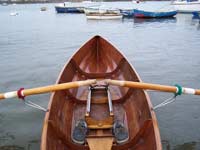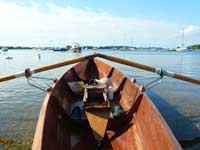Hi Chuck - here is a piece about
an adjustment I made to my rowing skiff that has
proved very successful.
On Monday (a holiday here in England) I rowed the
entire navigable length of the mighty River Hamble
(6 miles) and back. I felt just like Lewis (or possibly
Clark).
Best wishes,
Chris
Every so often on the boat forums, someone asks how
to position the rowlocks on a rowing boat correctly.
They inevitably want the spacing between the seat
and the rowlocks, but I have discovered the hard way
that the vertical adjustment of the rowlocks is just
as important for comfortable rowing, especially with
a sliding seat.
 |
Before: not
enough room under the oar handles
click images
to enlarge |
My sliding seat skiff Snarleyow (Andrew Wolstenholme’s
lovely Sprite design) has always felt a bit cramped.
I am average height (6ft 5in), and getting my knees
up between my arms as I moved forward was a tight
squeeze – I almost had to scrape the oar handles
down over my shins to keep the blades out of the water.
Recently, matters got even worse, which may be something
to do with my waistline getting even more average.
I would have to breath out to allow room for my knees,
so breathing had to be strictly coordinated with rowing.
I could only take a dozen or so strokes before stopping
for a quick gasp.
When I started rowing Nessy, my Sandpiper
dinghy designed by Conrad Natzio, I was amazed at
how relaxed it was. I could row steadily for ages
without stopping for breath.
 |
After: oar handles
higher for comfortable rowing |
It was partly because the seat was fixed, of course,
but I soon realised that the higher position of the
rowlocks also made things a lot easier. I decided
to raise the rowlocks on Snarleyow too, by putting
spacer blocks under each rigger and a new hole through
the hull for the supporting strut underneath.
A rootle round the shed produced an offcut of Douglas
fir of exactly the right dimensions (and the domestic
authorities said I hoard stuff!). I cut it into four,
drilled a hole through each one and bought four long
bolts to secure the riggers in their new positions.
Snarleyow was transformed. My wrists no longer tried
to bash my knees, and rowing became relaxed and flowing.
Suddenly, I could row for long periods without having
to take a breather.
The next step was to make the job permanent by shaping
and sanding the blocks and gluing them in position
with Balcotan. A spot of varnish and she was ready
to go.
 |
Arundel on a
grey day |
To give the new rig a proper test, I rowed the five
miles up the River Arun from Littlehampton to Arundel,
taking the flowing tide up and waiting at Arundel’s
lovely tea rooms under the castle walls for the tide
to turn and come down effortlessly on the ebb. A great
trip, even though the weather was grey and forbidding,
and the new higher rowlock position made it possible
without too much pain.

More Articles by Chris Partridge:

|